Published Jan 2, 2025
WARP FIVE: Mike McMahan Tackles the Star Trek Multiverse
The creator/showrunner details what went into the fifth season's arc, friendships, villain reveal, Garashir, and more!
SPOILER WARNING: This interview contains story details and plot points for the fifth season of Star Trek: Lower Decks.
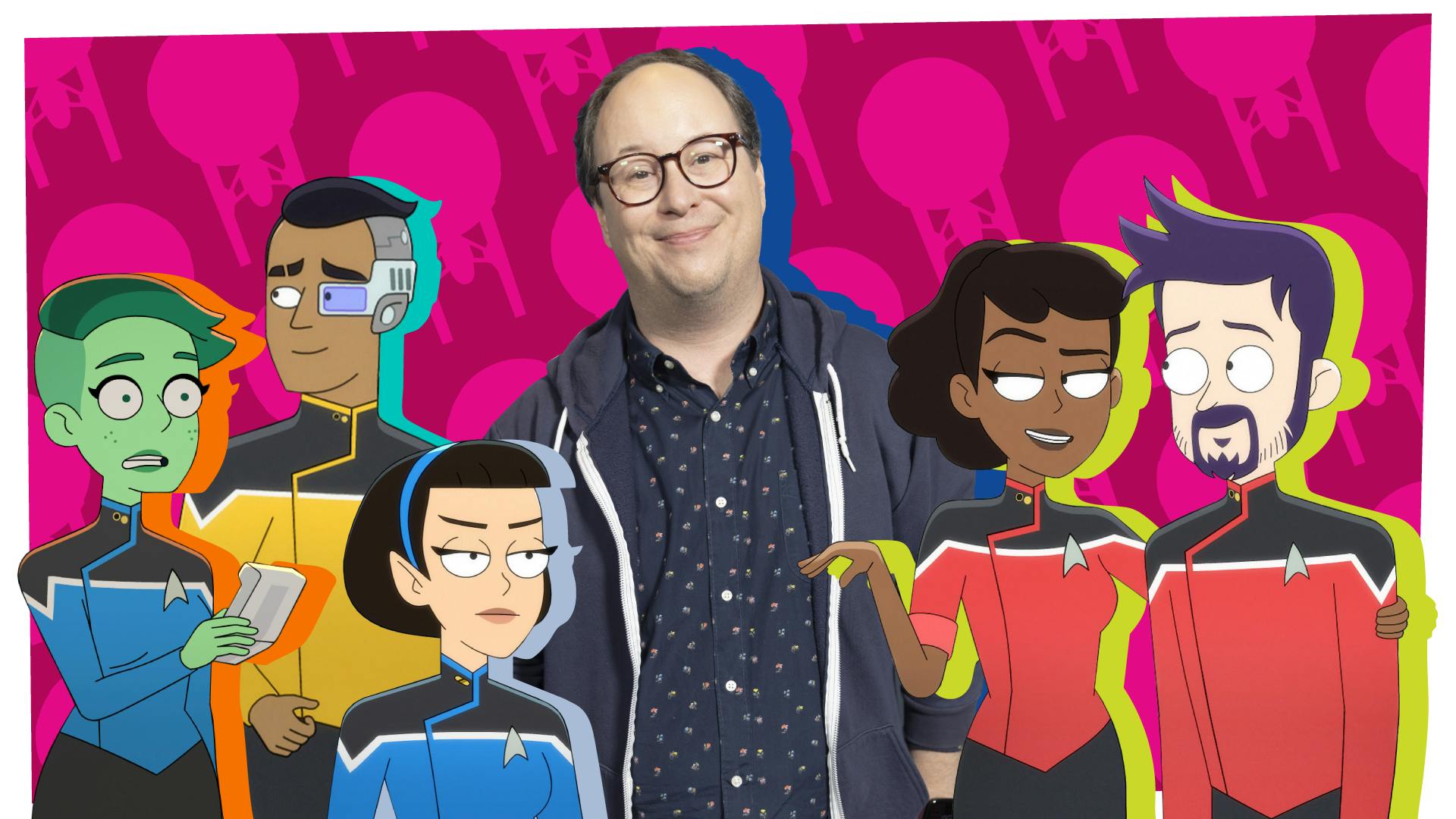
Getty Images / StarTrek.com
Welcome to Warp Five, StarTrek.com's five question post-mortem with your favorite featured talent from the latest Star Trek episodes.
The epic conclusion of Star Trek: Lower Decks saw the U.S.S. Cerritos save not only this Prime Timeline, but every quantum reality, as their universe saw an influx of energy overloading a dimensional rift.
When it comes to the Cerritos, it can never be easy. After all, this entire season has dealt with the potential Orion war, furious Klingons, diplomatic catastrophes, murder mysteries, and missions involving time dilations.
But as Lieutenant j.g. Beckett Mariner states in the series' finale, "The whole Cerritos crew is stacked with amazing officers.... We're explorers, we live for the unknown. You can't prepare for that. Nobody on the Cerritos is even close to perfect. We're a mishmash of people and various creatures that don't fit anywhere else. But we're a family. That's why I love it here. We believe in the mission and in each other."
StarTrek.com had the opportunity to talk with series' creator and showrunner Mike McMahan about Lower Decks' fifth season, the Cerritos' crew, the multiverse, and more!
On Leading Up to the Multiversal Finale
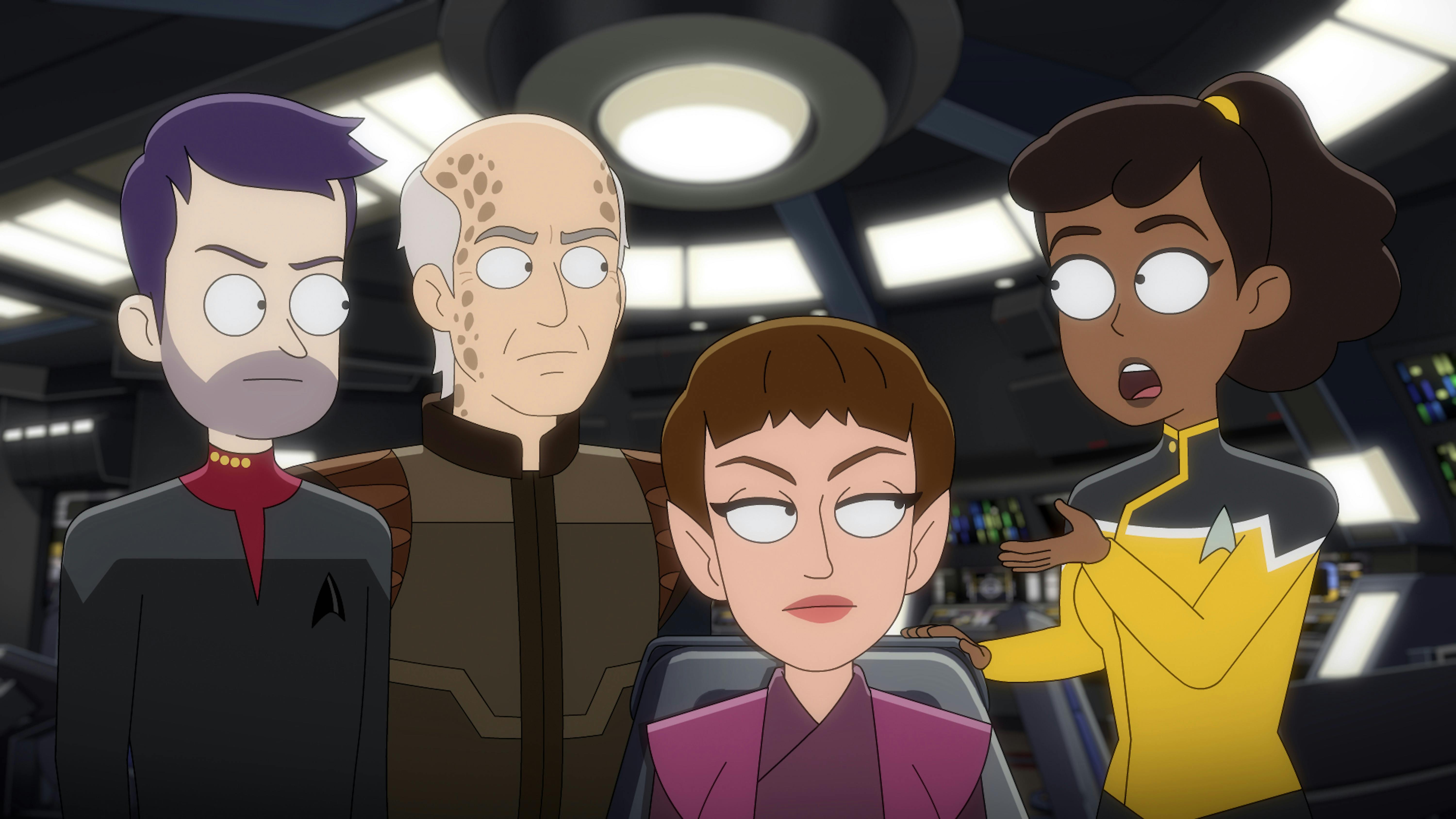
"Fissure Quest"
StarTrek.com
In pop culture, the Multiverse is having its moment, that it may seem overdone. As William Boimler remarks to his crew in "," "That's all the multiverse is — just lazy, derivative remixes!"
However, Lily Sloane later counters to the Anaximander captain that exploring different realities allows them to learn about humanity, "to better understand ourselves.... I'm learning about what humans can be, mapping our potential. So far, it's limitless."
On his approach, McMahan reveals, "It was important to me, after working at Rick and Morty for four seasons, that if I was going to do a multiverse thing, you had to have a Trek take on it. A lot of the theme of Lower Decks is we're not discovering stuff new in the quadrant. We're discovering stuff about ourselves. Having Lily say that the multiverse is the biggest expression of that was a very Lower Decks thing to do, and it got me the excuse of being able to have Jolene [Blalock] as T'Pol, and Harry Kim and Alfre Woodard and Garrett Wang and everybody, getting to have Garashir."
"The multiverse served two purposes," continues McMahan. "We got to tell a Star Trek version of the multiverse that we've seen a couple times. You've got the Mirror Universe and you have ',' but this was a Lower Decks way to look at it."
On the Multiversal Baddie
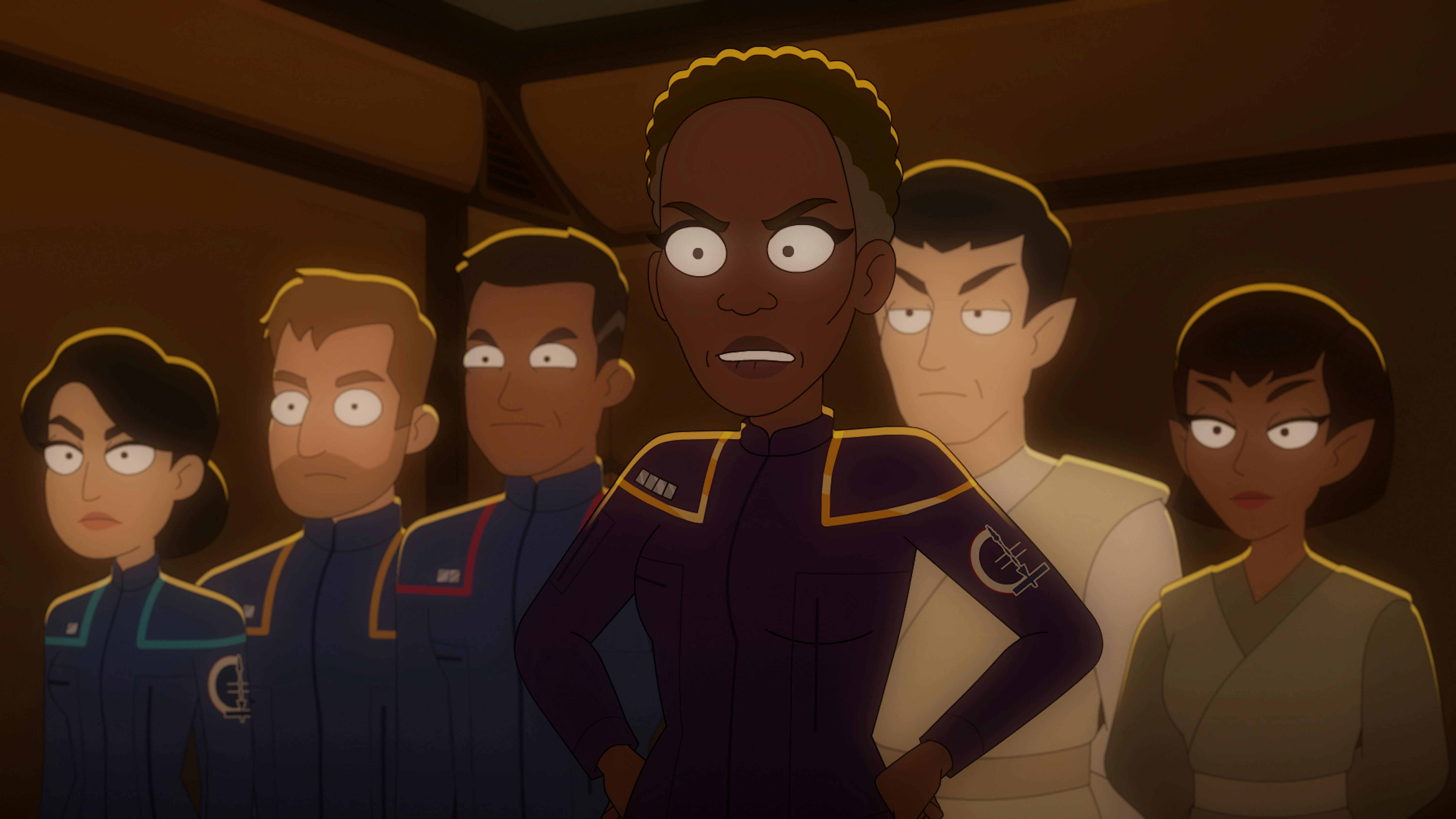
"Fissure Quest"
StarTrek.com
In "Fissure Quest," William Boimler, Engineering Mariner, and the rest of the crew learns that the person responsible for "destroying the multiverse" is not some depraved villain, but actually Lily Sloane and her crew. Their ship allows them to travel realities by creating subspace rifts. Unfortunately, creating those rifts weakened the integrity of all quantum realities.
Addressing the reveal, McMahan states, "I also liked that the big bad wasn't intentionally ripping open the multiverse. That it was a well-intended consequence of exploration. That fits into a Star Trek show more than it would fit into another sci-fi property. It just felt right. It felt like a way to get to have our fun but be able to say something, and get to have some cool spectacle while also not retreading the kind of multiverse stuff we've seen before."
On This Season's Guest Stars
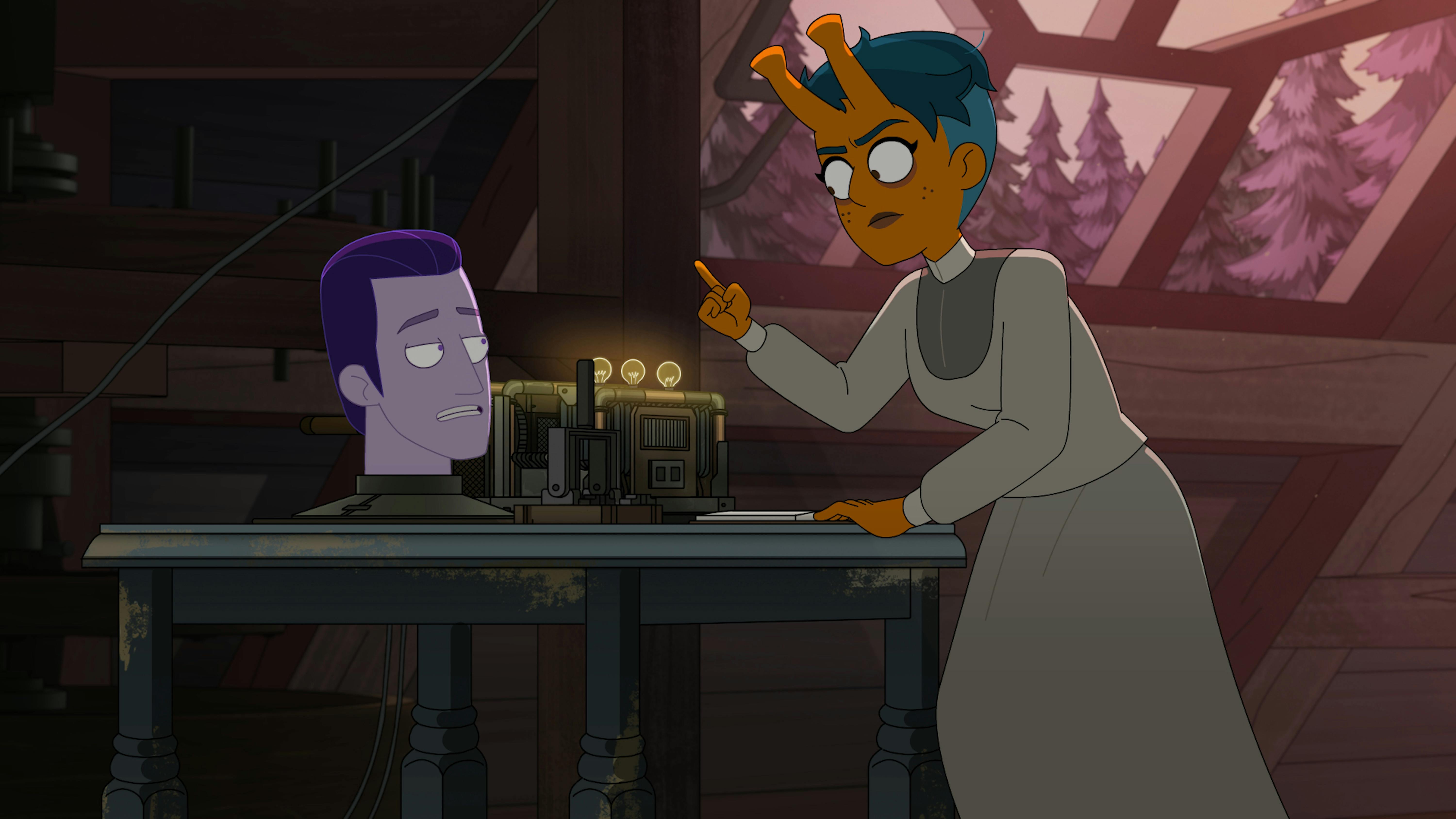
"Fully Dilated"
StarTrek.com
There was no shortage of incredible Star Trek talent appearing this season ranging from Brent Spiner (Data) to Alfre Woodard (Lily Sloane) to Andrew Robinson (Garak) and so much more.
"Every single legacy actor who agrees to do Lower Decks is always so kind," notes McMahan. "And they're always like, 'Yeah, this is fun, of course I would do it,' and I'm always so nervous. I write them letters and I send them the script, and we work around their schedules."
"For me it was a combination of, 'Oh no, I'm not going to have a Star Trek show after this. I gotta try to get people I really want to work with,' like Brent. I would've loved to have figured out a way to get to work with LeVar [Burton] too, but I couldn't quite wrap my head around it. Then I'm just such a big fan of T'Pol and of Lily Sloane, and for me, those were like, 'Oh, they are very Star Trek to me and we don't see them a lot, so I'm going to give them another crack at a character moment for them.'"
On Playing Around in the Trek Fandom Sandbox (i.e. Garashir)
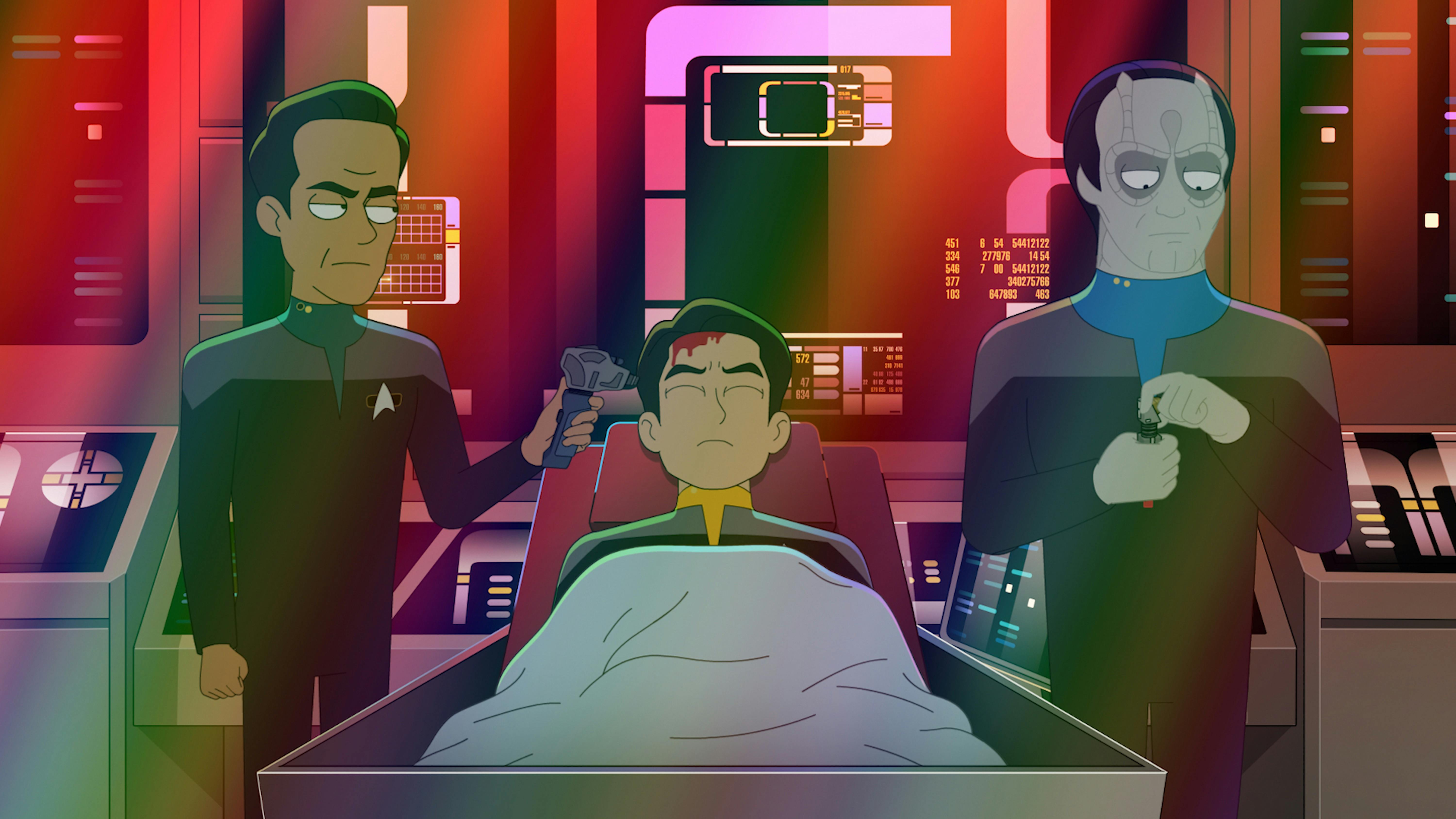
"Fissure Quest"
StarTrek.com
The multiversal story arc allowed McMahan to touch upon fandom darlings in a way that didn't mess with the Prime Timeline.
"Then there are these fandom touch points, of like Harry Kim never having been promoted," explains McMahan. "I'm like, 'Okay, how can we have fun with that? What if we had 10 Harry Kims who hadn't been promoted and one who had?'"
"Then obviously, Garashir is just like, I'm not blind to the fandom," McMahan adds. "I didn't come up with Garashir. That's been around long before me, but getting to tell a story where Dr. Bashir is a hologram like my beloved Voyager hologram doctor, and that Garak is a surgeon instead of a tailor because they both sew things up, one of them clothing, the other one injured people. Then seeing them not only together but in not a new relationship, one that's already happened and we're just getting to enjoy them being a couple, felt like a big choice. That was really rewarding to get to see, because it's asking you to catch up to something that's normal to them, which feels really good because I think fandom, when they're shipping people, it's often asking people to say, 'Bear with me on this, here's how it's going to happen.' In this, it was like you don't need to bear with me or not. This happened. This is what they're like. This is who they are. Getting to express it in that way I thought was really cool. That felt honest. It felt like those characters. That fits into those characters' dynamic."
On Boimler and Mariner's Friendship
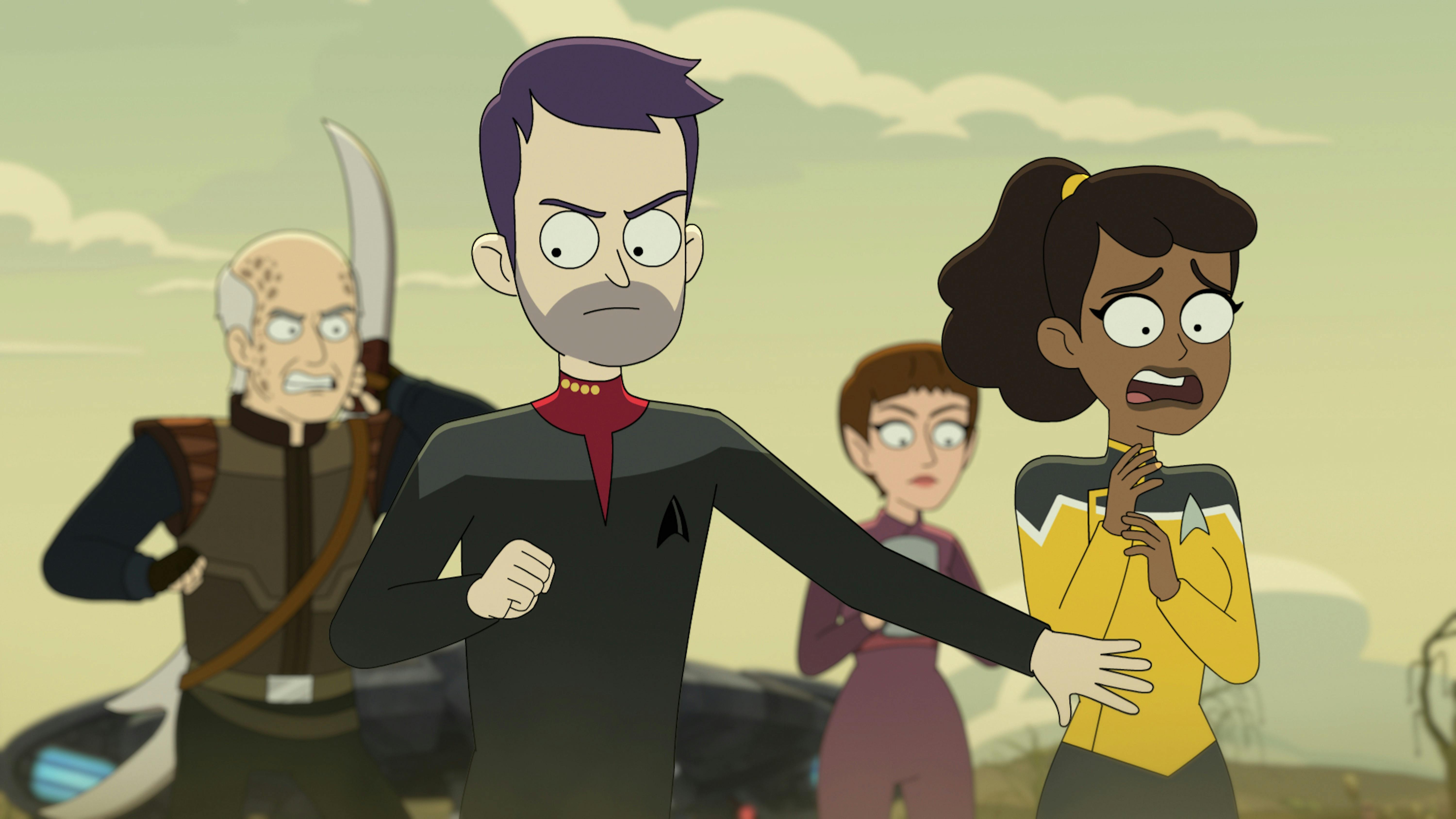
"Fissure Quest"
StarTrek.com
In "Fissure Quest," Lily Sloane poignantly tells William Boimler that his friendship with Beckett Mariner "transcends realities," with for "really examining the power of friendship and the power of community," which she sees as reinforcing the "utopian vision for the future of what Star Trek is."
Recalling the beginning of the series, McMahan states, "To me, it was a culmination of the Season 1 finale, when Boimler goes to the Titan, and the choices that Boimler is making versus the Boimler that comes back to the Cerritos. Boimler is a guy who makes mistakes but is always trying to be better, and that's where a lot of his comedy comes from."
"I think seeing [William Boimler], because a lot of people are like, 'Oh, wow, we didn't really spend time with the Lower Decks characters in Episode 9,' but that's not true. This is a Boimler-and-Mariner episode," continues McMahan. "You're seeing versions of them and how their friendship is so important. You see a change in William across this episode. You see him learn something that's like a lesson that's come four seasons in the making. I really love that that's oftentimes the theme of Lower Decks, it's support of the friends around you. Give them grief, have fun with them, but these communities that we build, these families that we build, are so important."





